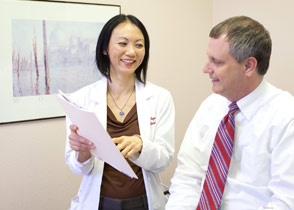“Take immediate action to prevent further spread of COVID-19.
Have you received notification that you tested positive for the virus that causes COVID-19? There is no reason to panic. Most individuals who are not at increased risk for severe COVID-19 illness typically experience a flu-like episode and fully recover.
If you test positive for COVID-19, you should:
- Isolate yourself at home and do not leave the house unless you have been instructed to visit a health care facility.
- Wear a disposable face mask OR cloth face cover to protect others from contaminated respiratory droplets that enter the air when you cough or sneeze.
- Stay in a separate room with a separate bathroom, if possible.
- Maintain at least 6 feet distance from others.
- Keep all ‘high-touch’ surfaces clean. This includes doorknobs, tabletops, telephones, and even your computer and keyboard.
- Limit contact with housemates, especially those who are at increased risk of severe COVID-19 illness (elderly or immunocompromised individuals and those with respiratory problems).
- Among the most effective practices that limit the spread of COVID-19 is practicing good ‘respiratory etiquette’ and hand hygiene:
- Avoid touching your eyes and mouth.
- Dispose of tissues after coughing or sneezing.
- Wash your hands regularly and thoroughly with warm, soapy water for 20 seconds. Use alcohol-based hand sanitizer in a pinch, if soap and water are not available.
If you are older than 65 and/or you are immunocompromised or have an underlying chronic health condition, you have a higher risk of developing more severe COVID-19 illness. Follow the same practices as everyone else, closely monitor your symptoms, and seek medical care if your symptoms worsen.
Notify close contacts.
As a courtesy and as an important step in controlling the pandemic, try to notify the people with whom you have been in contact over the past 7 to 10 days.
Contact your healthcare provider if symptoms worsen.
The same type of home care you would use for cold or flu symptoms also works for most patients infected by SARS-CoV-2. [For pain relief and fever reduction with coronavirus, there are some reports to avoid ibuprofen (Advil, Motrin) and use acetaminophen (Tylenol) instead, but there is no scientific evidence to support the claim.]
But, severe COVID-19 illness extends beyond cough, fever and congestion. Immediately notify your healthcare provider for any of the following symptoms:
- Chest pain
- Chest tightness
- Difficulty breathing (having a hard time “catching” your breath)
- Altered mental status
- Bluish lips/skin (cyanosis)
Keep track of your symptoms and the calendar.
Start a journal to record your temperature readings. Measure your temperature more frequently if fever occurs. Note the dates when symptoms emerge, their severity, and their resolution. This is powerful information to share with your healthcare team as they track your progress or in case complications ensue. You can expect to remain in isolation until any fever has resolved for three days with steady improvement in your other symptoms.
Give yourself the time and space to completely recover, which takes a few days to a week in most cases of COVID-19. Reach out to friends and family and other support groups.”
From Healthgrades: What to do if you test positive for COVID-19, Healthgrades
PLEASE QUARANTINE YOURSELF FOR 14 DAYS FROM START OF SYMPTOMS TO FULLY RECOVER. YOU SHOULD NOT GO OUT IN PUBLIC UNLESS YOU HAVE BEEN WITHOUT A FEVER WHILE OFF FEVER-REDUCING MEDICINES FOR AT LEAST 3 DAYS.
For those interested in donating convalescent plasma: How to Donate Convalescent Plasma


